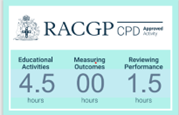This course aims to increase GPs’ confidence in supporting women and transgender men to choose between different contraceptive methods considering acceptability, safety, and efficacy.
Cost: $330
Delivery method
- Self-paced, online
- ~9.5 hours duration
Who should register?
- General practitioners
- Nurse practitioners
- International medical graduates and medical students
- GP registrars
- Registered nurses
- Registered midwives
- Aboriginal and Torres Strait Islander health practitioners
Eligibility
Medical or nursing qualifications are advantageous but not necessary.
Overview
PLEASE NOTE – This course is one of the seven modules of the FPAA National Certificate in Reproductive and Sexual Health for Doctors course
This course aims to upskill clinicians with evidence-based information in:
- Sexual health counselling
- Assessment of contraindications (co-morbidities/drug-drug interactions) to specific contraceptive methods
- Efficacy and suitability of specific contraceptive methods
- Management of complications associated with specific contraceptive methods
The course consists of 12 modules, which are embedded with clinical images, diagrams, case studies, and links to references and resources with knowledge checks throughout.
A list of the module topics is below. For each contraceptive method, the mode of action, advantages and disadvantages, contraindications, and management of complications are explored.
- Introduction
- Intrauterine devices
- Etonogestrel implants
- Depot medroxyprogesterone acetate (DMPA)
- Progestogen-only pill (POP)
- Combined hormonal, oral & ring, contraceptives (CHC)
- Emergency contraception
- Barrier methods
- Fertility awareness and other ‘natural’ methods
- Permanent contraceptive methods
- Contraception and specific health conditions
- Resources
Course info
Course outcomes
Upon completion of this course, you will be able to:
- Describe the mechanism of action, efficacy, side effects, contraindications, risks, advantages, and disadvantages of all forms of available contraception in people with uncomplicated and complicated SRH history
- Explain the function and demonstrate the usage of UK Medical Eligibility Criteria (UKMEC) when assessing contraceptive needs prior to prescribing
- Explain the concept of typical use vs perfect use efficacy
- Provide appropriate advice on initiation of contraceptive methods, including Quick Start
- Manage troublesome side effects of contraceptive methods
An electronic Statement of Completion will be awarded upon completion of the course.
This statement can be used to support a clinician’s annual declaration of Continuing Professional Development (CPD) hours as part of their registration requirements. Minimum CPD hours for completed training: 9.5
Assessment
Short assessments are included to test knowledge.
CPD information
This education is a CPD Activity under the RACGP CPD Program.

This is an accredited activity under the Australian College of Rural and Remote Medicine (ACRRM): Professional Development Program.

FAQ
How long do I have to complete the course?
You have 6 months from the date of registration/payment to access the course content. This is to ensure that you are accessing the most up-to-date version of the course.
Can I print the online content to read?
This course is delivered entirely online. True does not recommend printing this online content. There are links to further resources within the course, which may be suitable to print if necessary.
Course enquiries
Clinical Education Unit
Email: ceu@true.org.au



